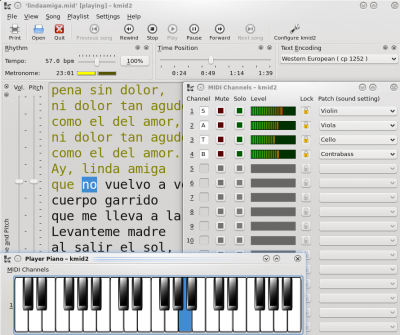KMid/uk: Difference between revisions
(Created page with '==Що ще не готово?==') |
(Created page with '* Підтримка декількох портів виведення даних MIDI. У поточній версії виведення можливе лише до єдин...') |
||
| Line 30: | Line 30: | ||
==Що ще не готово?== | ==Що ще не готово?== | ||
* Підтримка декількох портів виведення даних MIDI. У поточній версії виведення можливе лише до єдиного порту. | |||
==ChangeLog== | ==ChangeLog== | ||
Revision as of 10:24, 14 September 2010
Template:I18n/Language Navigation Bar
 |
Просте караоке або як витиснути максимум з вашого синтезатора MIDI! |
KMid програма є частиною модуля додаткових програм KDE (Extragear), нові версії не обов’язково постачаються разом з новими версіями KDE. Найсвіжішою стабільною версією є 2.4.0, датована 15 серпня 2010 року.
Отже, яким є поточний стан розробки?
У поточній версії реалізовано
Ось основні можливості, які реалізовано у KMid2:
- Підтримка файлів MIDI і Karaoke.
- Відтворення за допомогою зовнішніх апаратних пристроїв MIDI.
- Можливість використання програмних синтезаторів, зокрема Timidity++ і QSynth/FluidSynth.
- Регулятори темпу і гучності.
- Додано регулятор тону (транспозиції).
- Перегляд ритму (візуальний метроном).
- Можливість зміни кодування символів, шрифту та кольору тексту пісень.
- Списки відтворення (збірки пісень).
- Карти відображення MIDI, можливість трансляції загальних подій MIDI у простори подій, з якими можуть працювати нестандартні синтезатори.
- Вікно каналів з кнопками вмикання режимів сольного відтворення та вимикання звуку, а також вибору інструментів.
- Панель клавіатури піаніно з використанням зображення та технології VMPK.
- інтеграція з Konqueror.
- Робота у Linux, Windows і Mac OSX.
Що ще не готово?
- Підтримка декількох портів виведення даних MIDI. У поточній версії виведення можливе лише до єдиного порту.
ChangeLog
2010-08-15 Release 2.4.0
- New kmid_part. This component can be integrated easily in any KDE program, for instance Konqueror can play MIDI files with it.
- New DBus interfaces
- libkmidbackend has some new methods, version bumped to 1.0.0
- New and updated translations
- Assigned default shortcuts to keyboard media keys
- Fix in vumeter widget: drawing errors and CPU usage
- Fixes in all backends for initial MIDI program changes
- Fix in ALSA sequencer backend: bug 242912 (requires Drumstick >= 0.4)
2010-06-12 Release 2.3.1
- Fixes in ALSA sequencer backend: bugs 240391 and 240394
- New and updated translations since the last release
2010-04-26 Release 2.3.0
- New Mac OSX and Windows backends
- Fixes in ALSA sequencer backend:
- don't set an explicit output pool size, using the default size instead.
- unconditionally reload MIDI devices before checking the available outputs.
2010-03-14 Release 2.2.2
- Fixed program termination, stopping active notes.
- Fixed a crash when shuffling an empty playlist.
- Fixed creation of examples and system songs bookmarks at runtime, for file open dialog places. Bookmarks are created only when files are found.
- Fixed saving the initial MIDI connection dialog selection.
- Replaced the initial MIDI connection dialog by a new one enabling online help access, and better design.
- The last directory used in several open/save dialogs is now saved between sessions.
- Drumstick libraries v0.3 are needed.
2010-02-08 Release 0.2.1
- Automatic detection of text encodings for lyrics
- Get channel labels from SMF metadata (track names)
- Pianola window: added labels showing the channel names
- Check the runtime ALSA driver version for advanced MIDI ports
- Patch from Kevin Kofler adding a "pulseaudio" option for TiMidity++
- Fixed a memory leak
- Fixed command line play lists handling
- Fixed settings dialog: soft-synth audio output combos and apply button
2010-01-27 Release 0.2
- External soft-synths can be automatically launched at startup. A new page including FluidSynth and TiMidity++ settings has been added to the "Configure kmid2" dialog.
- Each channel may be labeled in a text field besides each channel number.
- New "lock instrument" button in the channels window to override the song's predefined instruments.
- Settings per song can be saved and automatically retrieved, including text encoding, volume, pitch, rhythm, channel labels and fixed instruments.
- The sample songs location is added to the places navigation panel in the open dialog.
- Several other usability enhancements. Many thanks to the KDE Usability Team for the suggestions.
2009-12-30 Release 0.1.1
- Recent files menu
- Highlight trimmed syllables, ignoring leading and trailing white spaces
- Allow stop in paused state
- Synchronized with lib. aseqmm 0.2.0
- Assorted fixes
2009-11-30 Release 0.1.0
Demo
See KMid in action in this Screencast
Notes for usage
- If you use Timidity++ as a software synthesizer, you may have to install GUS patches or sound fonts. You can find them at freepats
- Fluidsynth is an alternative. It has a helpful gui called QSynth. For soundfonts, try General User GS.
- For more information and options, there is a tutorial available.
Download
- Source packages
- openSUSE Build Service - Search packages
- Gentoo ebuild
- Arch Linux
- Mandriva and Fedora users: available at the official repositories of your Linux distribution.
Resources
- Some sample .kar and .mid files are installed with the application. Others are available from http://www.mididb.com/ and http://midikaraoke.com/songdir/ . There is a useful search engine at http://www.vanbasco.com/midisearch.html
- If you are interested in building for testing, please read the README
- The source code repository for testing and development is available from here
Note
This status report has been updated on 15th August 2010
